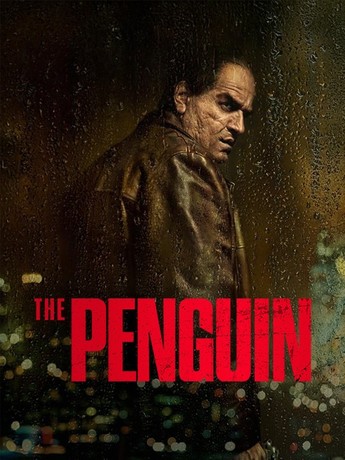The Moral Challenge of Cheering for The Penguin
If you’re reading this, you probably like stories where you can cheer for good characters. You like morally upstanding protagonists who aim for an ideal. The Penguin, Matt Reeves’ streaming series set in the same universe as The Batman, is not such a story.
Oswald Cobblepot (The Penguin), played brusquely by Colin Farrell, starts out as a bad man who remains one till the very end. He is a traitor, a liar, a backstabber, and a murderer. He doesn’t even adhere to a “code of honor” among his fellow criminals. But he is the protagonist we’re supposed to cheer on to victory. And as a character, he’s a good one—driven, passionate, emotional, action-oriented, indomitable. Farrell is so good at playing evil that he just joined Heath Ledger and Joaquin Phoenix on the short list of actors who’ve won Golden Globes for performances as Batman villains.1
I recently finished The Penguin and it got me asking two questions.
(Spoilers to follow.)
 Can we truly root for characters who aren’t good? To say there are no good characters in The Penguin is an understatement; it is a full-on evil-versus-evil tale. Sofia Falcone, Oswald’s archnemesis played by Cristin Milioti, dons a gas mask and a stunning satin evening gown to murder her whole family. And since I’m looking for redeeming qualities here, I’ll forgive that on account of fashion. Throughout the series, the wardrobe department really put in the work to give slay queen a whole new meaning.
Can we truly root for characters who aren’t good? To say there are no good characters in The Penguin is an understatement; it is a full-on evil-versus-evil tale. Sofia Falcone, Oswald’s archnemesis played by Cristin Milioti, dons a gas mask and a stunning satin evening gown to murder her whole family. And since I’m looking for redeeming qualities here, I’ll forgive that on account of fashion. Throughout the series, the wardrobe department really put in the work to give slay queen a whole new meaning.
Much has been written about the rise of antiheroes and sympathetic bad guys in modern storytelling. In The Sopranos, The Boys, Breaking Bad, Hannibal, and similar stories, the main characters are outright evil or at least morally, ethically, and legally challenged (to put it mildly). These characters often capture genuine audience support by:
- the revelation of a tragic, morality-warping backstory,
- the pursuit of some goal even the audience can see as worthy,
- being less bad than their antagonist.
The first two of these elements are present to some extent in The Penguin. Oswald is a servant of the Falcone crime family. Born with clubfoot and rising from less-than-ideal circumstances, he harbors dreams of making it big in Gotham’s underworld. He loves his dementia-afflicted mother and is driven to make a better life for her by any means necessary. Can’t we all identify?
The third element, however, is not. Oswald is easily the more evil character in the show—and, as the penultimate episode reveals, he’s been evil since childhood.2 Which leads to my second question: How might we, the audience, be shaped by cheering for characters who have none of those “redeeming qualities”?
Victor Aguilar provides a case study for the dangers of such support. The 17-year-old kid played by Rhenzy Feliz comes from a low-income East Side neighborhood like Oswald’s. A run-in with Oswald gets him caught up in the murder of the Falcone heir. Victor is appalled by Oz’s cover-up and disposal of the body, but he’s in too deep already. He has to go along with Oswald’s schemes, or he’ll end up dead too.
Eventually, Oswald appears to take a genuine interest in the boy. He encourages the stuttering teen to speak up for himself, boosts his confidence, teaches him how to shoot, gives him pep talks, and ultimately relies on him to look after his mom when mafia business gets dicey. You know, typical mentor-mentee stuff.
Victor eventually buys the dream Oswald is selling. And through him, we begin to buy that dream as well. Someone has to give Gotham’s forgotten down-and-outers something to believe in—cashflow, steady jobs, and the promise of keeping electricity running in their overlooked neighborhoods. Sure, it’s all thanks to a massive underground drug trade, but you can’t have it all, right?
Oz’s influence reshapes Victor. He transitions from innocence to a place where he can kill one of his own neighbors. Eventually, Victor only cares about Oz and what Oz wants.
Yet, in the final episode, after Oswald manipulates Gotham authorities into locking up Sofia Falcone and gets everything he ever wanted, he chokes Victor to death on the riverbank, betraying the only person beside his mother who had ever been truly loyal to him.
This seems to be the creators’ way of underlining the absence of potential redemption for the Penguin. Showrunner Lauren LeFranc notes Oswald killing Victor as the moment he also “kills his own heart” and “becomes a monster.”3 For what it’s worth, he’s been a monster all along. Are we, the audience, meant to be okay with that?
I recount Victor’s story because it mirrors the real-world danger of being in thrall to bad characters: we might be remade morally in their image. We might consider the aftermath of Luigi Mangione allegedly killing UnitedHealthcare CEO Ben Thompson. Some will argue that, in his own way, Thompson was a kind of bad man already and had been for a long time. But after Mangione shot him early one morning on a Manhattan street, folks on the internet hailed the shooter as a champion for the underdogs (much like Oswald is cast in Penguin). They swooned over his “hot assassin” looks (something Oz does not have going for him), laugh-reacted to Facebook posts about the killing, and donated to his legal defense fund.
While the Mangione-Thompson affair intersects with broader social issues, our moral inclinations are partly shaped by the stories we tell and participate in, by the characters, fiction or nonfiction, whom we identify with and support.
The Penguin is a very good series—excellent writing, beautiful acting, fantastic design. I like it. But do I like Oswald and Victor and Sofia Falcone? Certainly, from a creative standpoint, I like them as characters. But even then, I wonder if there isn’t a subtle direction in which my morality might turn if I continue partaking in such stories and rooting for someone like Oswald to achieve his goals.
- Ledger and Phoenix also won Oscars for their performances as the Joker. Nary a Batman actor has been nominated. Hmm. ↩
- Some are likely to argue that Oswald suffers from some kind of pathology, psychosis, or mental condition. I had such thoughts too, especially after the flashback in episode seven. Maybe he was just born wrong. But at no time does the show suggest Oswald is not in control of himself and his actions, so that’s a conversation for another day. ↩
- The Penguin: Episode 8, after-show behind-the-scenes interviews (on HBO Max). ↩





























Share your fantastical thoughts.